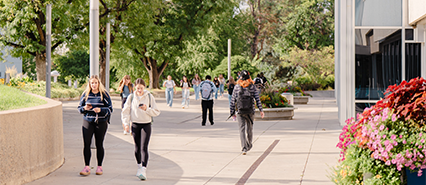Chemistry, Bachelor of Science

Program Overview
The Chemistry, BS program at CSU Pueblo prepares students to be responsible, scientifically literate professionals by providing the highest quality of undergraduate level chemical education via an innovative modern curriculum as well as faculty-mentored research and internship opportunities.
The chemistry curriculum is certified by the American Chemical Society and is supported by our state-of-the-industry laboratory equipment and instrumentation for coursework and research.
Students accepted into the program have several opportunities and are encouraged to participate in active research programs carried on by faculty, as well as research at other universities, local businesses, and government laboratories.
Frequently Asked Questions
-
Do you have to take a class/lab in the same semester?
Although it is highly recommended to take a course with its lab concurrently, sometimes scheduling issues prevent this from happening. In such cases, it is possible to take the course first followed by a lab in a subsequent semester. It is never advisable to take a lab prior to taking the course.
-
How can i pass my Chemistry Classes?
Chemistry is not a subject that can be learned easily by most students. As a result, most students underestimate the amount of work required to pass a chemistry class. In general, the following pointers may help in succeeding in your chemistry class:
- Study, study, study. For most chemistry classes, studying a minimum of 3 hours outside of class for every class hour should be enough to earn a C in the course for the average student.
- Take advantage of your professor's office hours. Instructors teaching full loads are required to have 5 office hours per week which, in general, are rarely used by students. The professors are excited about students who are interested in learning and the office hours can give you one-on-one instruction. It also gives you an opportunity to get to know your professor for when you need letters of recommendation, etc.
- Form study groups or join the chemistry club. You have to know a subject fairly well to be able to teach it to someone and a group collective is usually able to bring a variety of different strengths to studying. There are a number of study areas available in the chemistry building and if the group gets stuck a professor will probably be available to ask for help.
- The gen ed tutoring center located in the Psychology building (Rm 232) or the Student Support Services (OUC underground) may have tutors available.
-
I’m interested in Forensics, what can I do next?
The chemistry department gets a huge number of inquiries related to forensic science likely due in part to the popularity of the crime shows like CSI and its variants. If your interest is in looking for and collecting evidence, reconstruction of crime scenes, apprehending suspects, etc., you likely will need to become a commissioned police officer.
If you are interested in analyzing evidence, this is usually done in crime laboratories. This would include things like DNA processing, drug and blood-alcohol determinations, trace evidence like hair and fibers, etc. To work in a crime laboratory, a physical or natural science degree like chemistry or biology is required and supplemental courses in forensic science are encouraged. The chemistry department offers an Introduction to Forensic Science as well as a Forensic Chemistry class that can be incorporated into the chemistry major as elective courses. Our graduates are currently employed in various crime labs including the CBI, the Colorado Springs Crime Lab and the Denver Police Department Crime Lab.
-
Are there research opportunities available?
YES! Most of the chemistry faculty engage in research and welcome undergraduate students into their labs, some as early as the sophomore year after you have completed general chemistry. Undergraduate research looks good on your resume and lets you apply the chemistry you learn in the courses. Please see any chemistry professor or the department chair for more information.
-
Do I need a degree to be accepted into pharmacy school?
In Colorado, a full degree is not required for entrance into pharmacy school. However, the application process is quite competitive so we always strongly encourage students to work toward their degree while completing the pharmacy school prerequisites. Completing a degree will enhance your chances of getting accepted into a pharmacy school.
-
How do I reach my professor?
All professors will have a schedule of office hours posted on their doors. Email addresses and phone numbers are available through the university web site, and the administrative assistant in Chem 111 is always available to help track down professors.
-
Should I do a 4-year planning sheet?
Yes as this will keep you on track for a timely graduation.
-
Are all Chemistry classes offered every semester?
No. The only chemistry classes that are offered every semester are the general chemistry sequence (Chem 121 and Chem 122 with labs), the Principles of Chemistry Class (Chem 111), and the Chem/Phys 150 course for teachers.
-
What chemistry classes are offered during the summer?
Usually the general chemistry sequence (Chem 121/122 and labs) is offered during the summer as well as the Chem/Phys 150 course for teachers. Other courses may be offered if demand is high enough; please see the department chair to express your interest.
-
Is there a Chemistry Club?
The Student Affiliates Chapter of the American Chemical Society or Chemistry Club is alive and well and it is open to all who have an interest in chemistry (not just chem majors). Magic Shows, field trips and social events are all part of club activities. See club faculty advisor Dr. David Dillon (C-209) for more information.
-
What kinds of jobs are available with a Chemistry degree?
A degree in chemistry can lead to jobs in industry, in government and in academia. Our graduates work in industry for companies such as large as Pfizer or as small as the local start-up Water Co. Government jobs can be as varied as federal government jobs at the USDA laboratories, state government positions at the Colorado Bureau of Investigations, or even local government jobs like at the Woodland Park Wastewater Treatment Plant. Many of our graduates go on to a professional school (pharmacy, medical, dental, veterinary, etc.) or graduate school. Teaching K-12 is another high-demand area for chemistry graduates. Historically, unemployment in chemistry related fields is quite low and currently in the Rocky Mountain Region unemployment is 2.3% (www.acs.org, 10/14/14).



